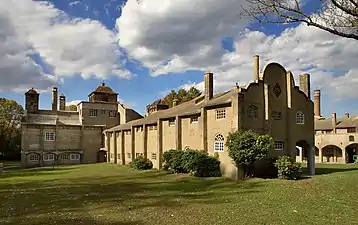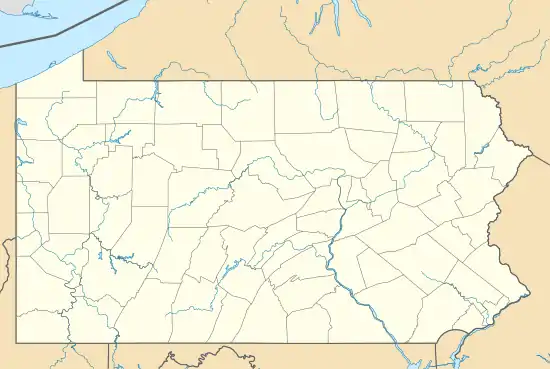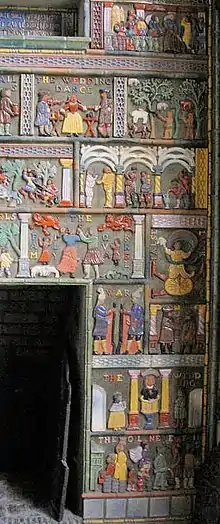Moravian Pottery and Tile Works
The Moravian Pottery & Tile Works (MPTW) is a history museum which is located in Doylestown, Pennsylvania. It is owned by the County of Bucks, and operated by TileWorks of Bucks County, a 501c3 non-profit organization.
Moravian Pottery and Tile Works | |
 Moravian Pottery and Tile Works | |
  | |
| Location | Doylestown, Pennsylvania |
|---|---|
| Coordinates | 40°19′23″N 75°7′25″W |
| Built | 1912 |
| Architect | Dr. Henry Chapman Mercer |
| Architectural style | Mission/Spanish Revival |
| Part of | Fonthill, Mercer Museum, and Moravian Pottery and Tile Works (ID85002366) |
| NRHP reference No. | 72001098 |
| Significant dates | |
| Added to NRHP | June 1, 1972[1] |
| Designated NHLDCP | February 4, 1985[2] |
The museum was individually listed on the National Register of Historic Places in 1972,[1] and was later included in a National Historic Landmark District along with the Mercer Museum and Fonthill. These three structures are the only cast-in-place concrete structures built by Mercer.[2]
History and museum features

Handmade tiles are still produced in a manner similar to that developed by the pottery's founder and builder, Henry Chapman Mercer. Tile designs are reissues of original designs. Mercer was a major proponent of the Arts and Crafts movement in America. He directed the work at the pottery from 1898 until his death in 1930.
Mercer generally did not affix a potter's mark to tiles made while he directed the work at MPTW. Following his death, there were several marks used to indicate that a tile had originated at MPTW.
When the Bucks County Department of Parks and Recreation took over the MPTW as a working museum, all tiles made by the museum were impressed on the obverse with a stylized "MOR," the words "Bucks County" and the year of manufacture (see illustration).
The reproduction tiles made today are made using Mercer's original molds, clay that is obtained locally and has properties similar to those of Mercer's original source, slips and glazes that follow Mercer's final formulations, although some have been modified to reduce the lead and heavy metal content to less toxic levels.
The Tile Works is one of three cast-in-place concrete structures built by Mercer. The others include Fonthill, which is located on the same property and served as his home; and the Mercer Museum, located approximately one mile away.
The Moravian Pottery and Tile Works offers workshops and an apprenticeship program to teach the art of handcrafting ceramic tiles and mosaics.
References
- "National Register Information System". National Register of Historic Places. National Park Service. January 23, 2007.
- "Fonthill, Mercer Museum, and Moravian Pottery and Tile Works". National Historic Landmark summary listing. National Park Service. Archived from the original on October 7, 2012. Retrieved July 2, 2008.
Further reading
- Reed, Cleota (1987). Henry Chapman Mercer and the Moravian Pottery and Tile Works. Philadelphia: University of Pennsylvania Press. ISBN 0812280768. An extensively illustrated biography of Mercer and evaluation of his role as an archeologist, architect, and artist.
- Mercer, Henry Chapman (1908). Guide Book to the Tiled Pavement in the Capitol of Pennsylvania. Doylestown: B. McGinty; reprint, Harrisburg, PA: Capitol Preservation Committee, 1997. ISBN 0964304848. Mercer's own guide and description of the decorative wall and floor tiles and their story.
- Bucks County Historical Society (1972). The Mercer Mile: The Story of Henry Chapman Mercer and His Concrete Buildings. Doylestown: Bucks County Historical Society. Describes the MPTW, Fonthill (Mercer's home) and the Mercer Museum, home of his American tool collection.
External links
- Official website
- Historic American Buildings Survey (HABS) No. PA-5381, "Moravian Pottery & Tile Works", 20 photos, 5 data pages, 2 photo caption pages
- Historic American Engineering Record (HAER) No. PA-107, "Moravian Pottery & Tile Works", 80 photos, 19 color transparencies, 21 measured drawings, 40 data pages, 10 photo caption pages

